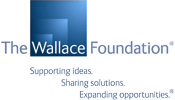Don't miss these two important ideas
I want our blog-community to be sure not to miss two important ideas offered in responses I found this morning to some previous postings.
Dennie Palmer Wolf (writer, researcher, consultant) urges us to focus not so much on talking to each other: "There are huge urgencies in contemporary education where arts educators need to take a leading role - and not by talking to each other. Among the most pressing issues is this: "Who gets the chance to do original work -- whether that is in history, in science, in mathematics - or in music, visual arts, or dance? In fact, the equity issue of this generation is "Who has the opportunity to incubate, pursue, refine and share new knowledge/visions/ or interpretations? So a major way in which arts education might come in from the margins is to begin to talk - not amongst ourselves - but widely and as active agents - about how educators champion young people's need (right?) to learn how to generate new ideas, works and views. That meeting could be initiated, chaired, even designed by arts educators, but just one homework session later. I want mathematicians, historians and world language teachers at the table."
Thanks, Dennie, and my response is the value of BOTH kinds of conversation. Arts educators are a huge resource to all education, and tend not to see ourselves that way or be treated that way. Just as the arts teachers are not generally seen as a uniquely valuable resource for creativity and engagement in a school. AND we really need, in my view, to get clearer on what our real strengths, priorities, and best offerings are, otherwise we risk offering fifty ideas to those major discussions in education, and getting impact with none.
And Gigi Antoni from Big Thought in Dallas (whose work has been cited so frequently here as a model of success) likes Richard's list of emerging trends in agreed-upon priority focus for the field, but wants to add to it: "I see multiple attempts in cities (Portland, Dallas, Philadelphia, Cleveland the list goes on) to innovate traditional arts education delivery systems so that they can provide coordinated, scalable, sustainable, relevant, high quality experiences for whole cities of children throughout their lifetime. These attempts use policy, advocacy, and research as tools, along with coalition building, community organizing and collaboration, to create something different. These are initiatives that are not driven from an arts, arts ed, or even wholly from an education agenda, but from a broader civic agenda. These cities are working to create new delivery models for arts education that include traditional instruction through school systems, while incorporating the broader community system in which schools exist. In some cases, these initiatives are challenging traditional notions of who in our community could legitimately teach the arts, when and to what end."
Arts education becoming part of (creating perhaps) broad civic coalitions that aspire to fulfill a broad civic agenda. And rethinking our ways and means as part of that.
About
Our Bloggers
Sam Hope, executive director, The National Office for Arts Accreditation (NOAA);
Jack Lew, Global University Relations Manager for Art Talent at EA;
Laura Zakaras, RAND;
James Cuno, Director, Art Institute of Chicago;
Richard Kessler, Executive Director, Center for Arts Education;
Eric Booth, Actor;
Midori, Violinist;
Bau Graves, Executive director, Old Town School of Folk Music;
Kiff Gallagher, Founder & CEO of the Music National Service Initiative and MusicianCorps
Bennett Reimer, Founder of the Center for the Study of Education and the Musical Experience, author of A Philosophy of Music Education;
Edward Pauly, the director of research and evaluation at The Wallace Foundation;
Moy Eng, Program Director of the Performing Arts Program at The William and Flora Hewlett Foundation;
John Rockwell, critic;
Susan Sclafani, Managing Director, Chartwell Education Group;
Jane Remer, Author, Educator, Researcher
Michael Hinojosa, General Superintendent, Dallas Independent School District
Peter Sellars, director
Contact us Click here to send us an email... more
Peter Sellars on Creativity & the Voice more

Leave a comment